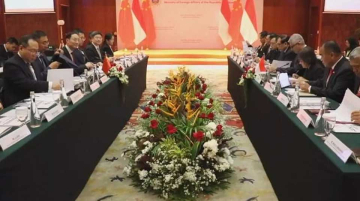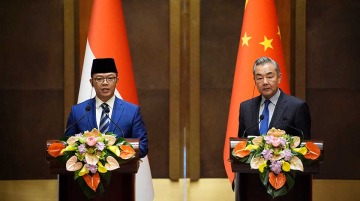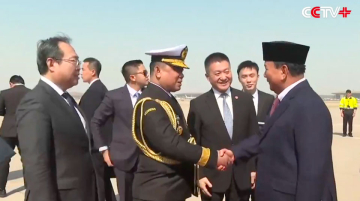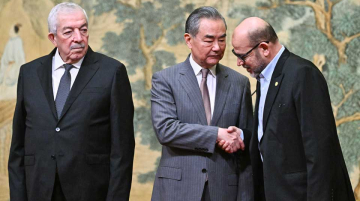
January has been a pivotal month for Indonesia as it navigates its complex relationship with China, marked by a series of high-level defense and security discussions. These meetings underscore Indonesia’s careful balancing act—strengthening ties with Beijing while maintaining sovereignty and regional autonomy. The engagements span maritime security, military cooperation, and geopolitical strategy, raising questions about Indonesia’s ability to preserve its strategic independence amid China’s growing influence.
Key Developments in Indonesia-China Security Relations
Indonesia’s evolving security and defense collaboration with China reflects a pragmatic yet cautious approach. While these discussions foster cooperation, they also highlight the broader geopolitical challenges, particularly in the South China Sea, a longstanding hotspot for regional disputes.
The following key meetings in January illustrate Indonesia’s strategic approach:
- Bakamla-CCG Maritime Security Talks (January 8, 2025)
The Indonesian Maritime Security Agency (Bakamla) met with the China Coast Guard (CCG) to enhance maritime cooperation. This meeting, a direct follow-up to agreements made by Indonesian President Prabowo Subianto and Chinese President Xi Jinping in November 2024, focused on:- Strengthening maritime security.
- Ensuring safe shipping lanes.
- Combating transnational crimes such as illegal fishing.
Bakamla Chief Irvansyah emphasized the importance of a mutually beneficial relationship to uphold regional stability, with both nations reaffirming their commitment to maritime security.
- PLA Chief of Joint Staff Liu Zhenli’s Visit to Jakarta (January 9-10, 2025)
A day after the Bakamla-CCG meeting, People’s Liberation Army (PLA) Chief of Joint Staff Liu Zhenli visited Jakarta for discussions with Indonesian defense officials, including Defense Minister Sjafrie Sjamsoeddin. The meeting resulted in agreements to:- Expand joint military exercises.
- Increase personnel exchanges.
- Explore opportunities for military technology transfers.
Liu’s visit reinforced Indonesia-China defense cooperation and signaled continued high-level engagement in security matters.
- Defense Minister Sjafrie Sjamsoeddin’s Visit to Beijing (January 22, 2025)
Later in the month, Indonesian Defense Minister Sjafrie traveled to Beijing for further discussions with his Chinese counterpart, Defense Minister Dong Jun. The focus remained on:- Strengthening joint military exercises.
- Enhancing personnel exchanges.
- Identifying new avenues for military technology collaboration.
Sjafrie underscored Indonesia’s commitment to dialogue in resolving regional security issues while ensuring that cooperation aligns with national interests.
Strategic Implications for Indonesia
These engagements highlight Indonesia’s delicate position. While Jakarta deepens security and defense cooperation with Beijing, it remains committed to protecting its sovereignty, especially in the Natuna Sea, where it disputes China’s territorial claims. Despite agreements on maritime and defense collaboration, Indonesia continues to reject China’s “ten-dash line” claim in the South China Sea.
- Risks of Maritime Cooperation
Indonesia’s willingness to discuss joint development in disputed areas could be seen as a pragmatic effort to manage tensions. However, it risks unintentionally legitimizing China’s territorial assertions, a stance that Indonesia has consistently opposed.
- The Need for Strategic Vigilance
While partnerships with China can enhance Indonesia’s defense capabilities, experts warn that Jakarta must ensure these agreements do not blur the lines of its territorial integrity. As Aristyo Darmawan from Universitas Indonesia notes, Indonesia must strike a careful balance between cooperation and safeguarding its sovereignty.
Indonesia’s Multi-Alignment Strategy
To maintain strategic autonomy, Indonesia continues to strengthen ties with other regional and global powers:
- Engagement with Japan: In early January, Japan’s Defense Minister Gen Nakatani visited Indonesia to discuss military technology transfers and security cooperation. Japan’s material support, though limited, signals a shared commitment to countering China’s assertiveness in the region.
- Collaboration with Australia and the U.S.: Indonesia’s defense partnerships extend beyond China, with growing security ties to Australia and the United States. This diversified approach ensures Indonesia is not overly reliant on any single power.
Conclusion: Navigating Regional Security Challenges
Indonesia’s commitment to sovereignty and strategic autonomy positions it as a key player in regional security. As Jakarta deepens its defense partnerships, strengthens maritime security, and asserts its territorial rights, it must navigate a complex geopolitical landscape.
The balancing act between engaging with China and reinforcing regional alliances will shape Indonesia’s role in great power competition. Its ability to manage these relationships effectively will determine whether it can maintain its position as a neutral yet influential force in the Indo-Pacific region.
Muhammad Zulfikar Rakhmat is the Director of the China-Indonesia Desk at the Center of Economic and Law Studies (CELIOS).





